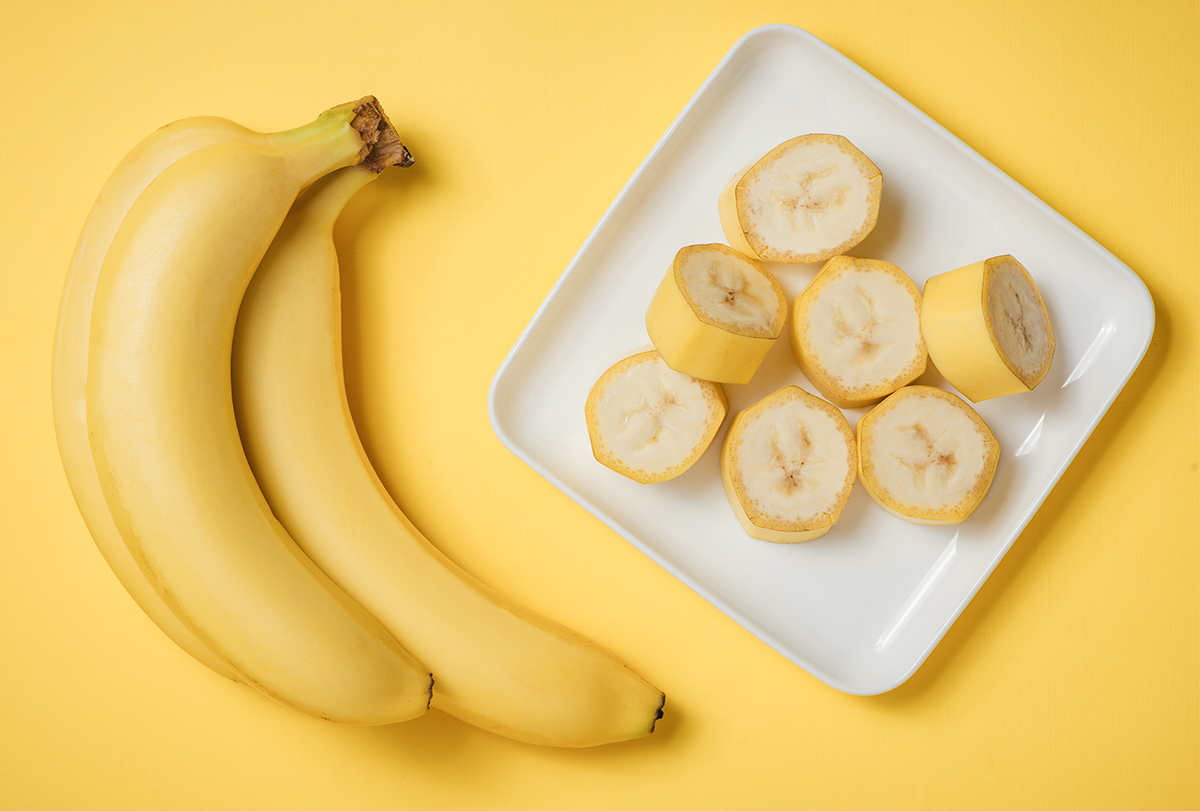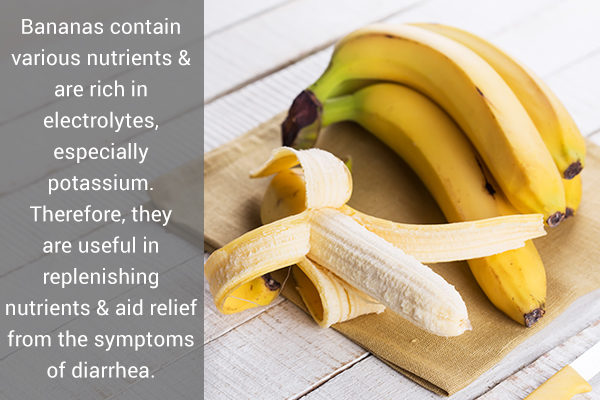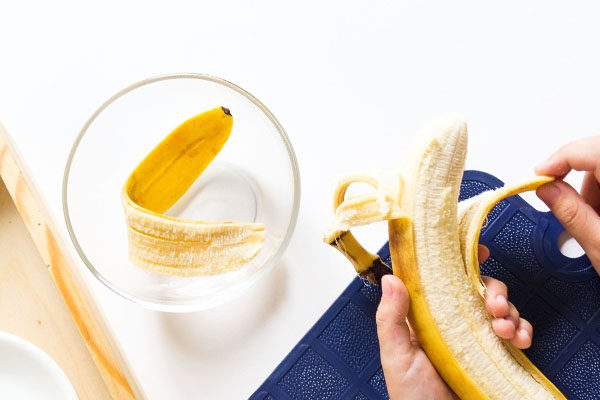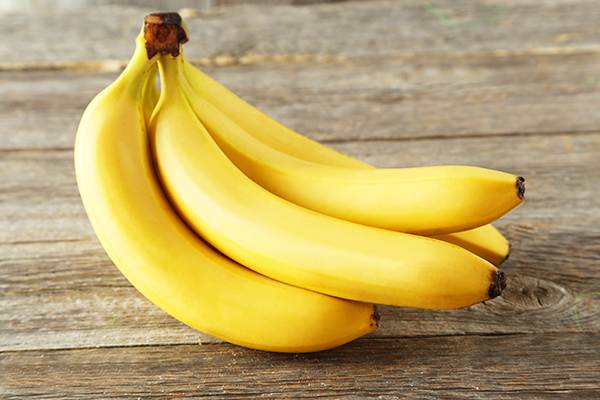In this article:
Bananas are popular around the world. The demand for bananas in the United States is greater than the demand for apples and oranges combined.

Bananas are curved in shape. They have a firm, creamy flesh that is wrapped in a thick peel. They grow in large clusters of 50 to 150, with 10 to 25 individual bananas found in bunches, or “hands.”
Bananas can have skins that are red, purple, brown, yellow, or green, with yellow bananas being the most common. This fruit is a powerhouse of nutrients and may be beneficial for many health conditions.
Nutritional Content of Bananas
A very popular fruit, bananas are packed with vitamins, minerals, and other beneficial phenols. (1) A medium banana has:
- 105 calories
- 1 g of protein
- 0 fat
- 27 g of carbohydrates, of which 3 g is fiber
- 422 mg of potassium, or 12% of your daily needs
- 26 mg of phosphorus, or 3% of your daily needs
- 10 mg of vitamin C, or 6% of your daily requirements
- 24 mcg of folate, or 6% of your daily needs (2)
Types of Bananas
The common varieties of bananas are:
- Banana (Cavendish): This classic banana is mildly sweet when ripe and has green or yellow skin, which gradually turns brown and, eventually, black.
- Plantain (Green banana): This banana is larger, is less sweet, and contains more starch. It is often used in cooking.
- Manzano: This fruit is often smaller and sweeter than the classic Cavendish banana. It has a typical banana flavor with a hint of apple.
- Red banana: This banana is shorter and plumper and has a dark red peel.
- Burro banana: This banana has a unique blocky shape. It is also shorter and thicker.
Health Benefits of Bananas
Given all the nutrients found in bananas, it is no wonder that this yellow fruit has many benefits for your health.
1. Keeps bowel movement regular

Bananas contain 3 g of fiber, of which about half is insoluble fiber (1.2 g). Insoluble fiber aids in softening the stools, as well as trapping waste products to be taken out of the body. (3)
Some studies demonstrated that green banana aids in the recovery from diarrhea. (4)(5) Another study found that eating a banana daily may improve bloating symptoms and is generally well-tolerated. (6)
Unripe bananas contain 100–250 mg of tannins and a lot of amylase-resistant starch. Hence, the overconsumption of unripe bananas may lead to constipation. (7)
Bananas can promote bowel regularity and may replenish nutrient stores after a bout of diarrhea. However, excessive banana intake can lead to constipation.
2. Helps control blood sugar
Bananas contain resistant starch, which is often fermented in the large intestine and acts a lot like fiber.
Resistant starch has been shown to reduce blood sugar, delay the emptying of the stomach, and improve insulin sensitivity. In these ways, bananas, particularly green bananas, may help with the management of diabetes. (3)(8) However, more research is required.
Bananas contain components that may be beneficial for type 2 diabetes.
3. Serves as a natural energy source

Bananas contain complex and simple carbohydrates, which provide both short-term and long-term energy. Bananas were found to increase antioxidant capacity and lower oxidative stress in athletes. (9)
4. Protects against stomach ulcers
Bananas may protect the stomach by aiding in the production of the stomach’s protective lining, which serves as a layer against stomach acid.
The fruit also contains compounds called protease inhibitors, which may kill bacteria in the stomach, including the bacteria that cause ulcers. (10) However, more research is needed to understand its proper usage and dosage.
5. Benefits celiac disease
Celiac disease is an immune-mediated disorder marked by a total intolerance to gluten.
Studies found that pasta made with green banana flour may be beneficial due to the nutrient-rich properties of bananas. (11)(12) Therefore, banana flour can be utilized as a substitute in various dishes to widen the food choices for people with celiac disease.
6. Helps with heart health
Bananas are a good source of potassium, a mineral that helps reduce the risk of stroke and other cardiovascular diseases.
Potassium helps the heart maintain a regular beat, maintains blood pressure, and works as an electrolyte to regulate water in the body. (13)(14)
The World Health Organization (WHO) recommends a potassium intake of 3,510 mg/day to lower blood pressure and decrease the risk of cardiovascular disease. (15) One medium banana contains 422 mg of potassium.
Consuming and Storing Bananas
Bananas can be eaten both cooked and raw. They can be pureed or blended. To store them for later use, bananas can be peeled, cut, and then frozen, dehydrated, or dried.
Plantains can be fried into chips and are a popular snack item. Whole plantains are also dried and then ground into flour.
It is recommended to hang bananas for longer shelf life. Hanging a banana on a hook exposes the cluster of bananas to an even and consistent amount of oxygen, allowing them to ripen gradually and evenly without pressure.
To slow the ripening process, store bananas away from other fruits, which emit ethylene gas that speeds up ripening.
Use of Banana Peels

The peels of bananas are also rich in potassium and other minerals. They may help keep teeth healthy, strong, and white and promote skin health.
Safety of Bananas
Bananas are generally safe as they do not contain pesticides because their peels are strong, thick, and protective. However, banana allergies can occur.
Allergic reactions can vary and include symptoms such as skin rashes, itching of the mouth and throat, swelling of the skin and mucosal linings, and even narrowing of the throat and wheezing.
Drug Interactions
Bananas can interact with these drugs:
- ACE inhibitors, such as captopril, enalapril, and lisinopril, can increase potassium levels. Therefore, eating bananas with these drugs can cause high levels of potassium in the blood, leading to irregular heartbeat and heart palpitations.
- Diuretics are used to reduce fluid in the body and also to manage blood pressure. The high potassium levels of banana may interfere with the electrolyte and fluid balance in the body.
Therefore, always speak with your doctor or pharmacist if you have questions about consuming potassium-rich foods such as bananas while taking certain medications.
Most-Asked Questions About Bananas
Do bananas affect weight?
Many people often avoid bananas when they are trying to lose weight because of the perception that they are high in carbohydrates. However, the resistant starches present in this fruit may lead to increased satiety. (16)(17)
Do bananas boost mood?
Two studies found that eating raw whole fruits is linked to lower rates of depression, anxiety, and negative mood and an increase in perceived life satisfaction. Researchers do not yet understand the link, so more research is needed. (18)(19)
Can babies eat bananas?
Bananas are often among the first foods introduced to babies when they start solid foods. Bananas can easily be mashed into a puree and fed to infants as soon as the pediatrician allows the introduction of solid foods.
How many bananas can I eat in a day?
Current recommendations are for adults to consume at least 2 cups of fruit per day. This is equivalent to about two bananas.
What happens if you eat too many bananas?
Bananas have no side effects when eaten in moderation. However, excessive consumption can lead to headaches, drowsiness, irregular heartbeat, and kidney issues. (20)
Expert Answers (Q&A)
Answered by Alex Roberts MS, CD (Registered Dietitian Nutritionist)

Bananas are portable and an easy low-calorie snack to take on the go. Bananas are made up mostly of sugar (fructose) and, when eaten alone, can cause hunger and an energy crash shortly after consumption.
When eating a banana, pair it with a protein source and healthy fat to help feel more satiated, have prolonged energy, and decrease your cravings and potential for overeating later in the day. Moreover, bananas can be consumed at any time of the day.
Eating a single banana with a glass of milk has not been shown to cause weight gain. However, eating any food in excessive amounts can cause weight gain if eaten regularly.
It is best to avoid eating anything 2–3 hours before going to sleep. Metabolism slows down while sleeping, and a full stomach can make falling asleep more difficult and uncomfortable.
However, if you are looking for a snack a couple of hours before sleep, bananas may be a good option as they contain tryptophan, which is known to help with sleep. Magnesium, potassium, and calcium are also known to help calm and relax muscles. (21)
Bananas have commonly been used to treat digestive health issues, including diarrhea, as they are bland and easy to digest.
Green or unripe bananas contain resistant starch, a type of carbohydrate that “resists” digestion in the small intestine and ends up in the large intestine. It is absorbed slowly and may support gut healing. (4)
Final Word
Bananas are a popular fruit around the world. This fruit can be enjoyed alone as a snack and in a variety of cooked and baked dishes. They are rich in many nutrients, making them a healthy choice. These fruits contain compounds that may be beneficial for heart and digestive health.
- Was this article helpful?
- YES, THANKS!NOT REALLY


